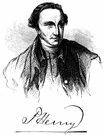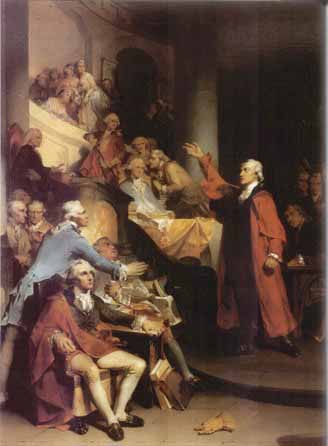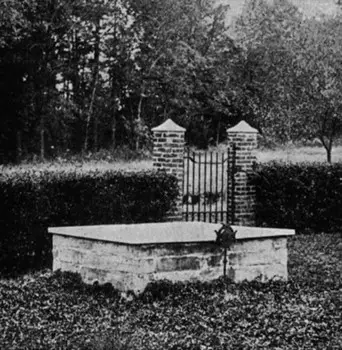He was born in 1736, in Hanover County, Virginia. He was educated at home, where he learned Latin, among other things. He tried to be a business owner, but the business went bankrupt. He studied law and earned his law license in 1760.
Henry was elected to the Virginia House of Burgesses, one of the colonies' first representative governments, in 1764. The following year, he introduced seven resolutions against Great Britain's new tax on paper the Stamp Act. With fiery words and a loud, convincing voice, Henry convinced his fellow burgesses to approve the resolutions, which sent a loud and clear message to the government in Great Britain that the American colonists were tired of "taxation without representation."
This speech took place on the same day that the British marched on Concord. The resulting battle, also at Lexington, is considered the beginning of the Revolutionary War. When Henry learned that Virginia Governor Dunmore had seized gunpowder from the storehouse in Williamsburg, he mobilized the militia of Hanover County and marched with them to demand the gunpowder back or money in exchange for it. The governor paid the money, then declared Henry an outlaw. Though he never himself served in the army, Patrick Henry continued the fight for independence in the House of Burgesses. He attended the Virginia constitutional convention and became the first governor of the new commonwealth of Virginia. He served three terms as governor before retiring to his home on Red Hill Plantation.
His health declined in the last year of his life, and he had to refuse President George Washington's appointment as Secretary of State and President John Adams's appointment as Minister to France. He died on June 6, 1799, at his home. He was 62. |
|
Social Studies for Kids
copyright 2002–2024
David White

 He made a name for himself in winning the famed Parson's Cause, during which he argued that a king who would veto a law passed by a locally elected legislature was "a tyrant who forfeits the allegiance of his subjects." This was the beginning of his struggle to ensure independence for the 13 Colonies.
He made a name for himself in winning the famed Parson's Cause, during which he argued that a king who would veto a law passed by a locally elected legislature was "a tyrant who forfeits the allegiance of his subjects." This was the beginning of his struggle to ensure independence for the 13 Colonies.
 Henry continued making speeches and practicing law throughout the turbulent years between his first famous speech and his next one, which he delivered in March 1775. He spoke to his fellow Virginians at St. John's Church in Richmond, urging them to take up arms in self-defense. Great Britain had gone too far in imposing taxes and other restrictions on Americans, and it was time for the colonists to defend themselves. He ended this famous speech with the words "I know now what course others may take; but as for me, give me liberty or give me death."
Henry continued making speeches and practicing law throughout the turbulent years between his first famous speech and his next one, which he delivered in March 1775. He spoke to his fellow Virginians at St. John's Church in Richmond, urging them to take up arms in self-defense. Great Britain had gone too far in imposing taxes and other restrictions on Americans, and it was time for the colonists to defend themselves. He ended this famous speech with the words "I know now what course others may take; but as for me, give me liberty or give me death." He did not attend the
He did not attend the 
